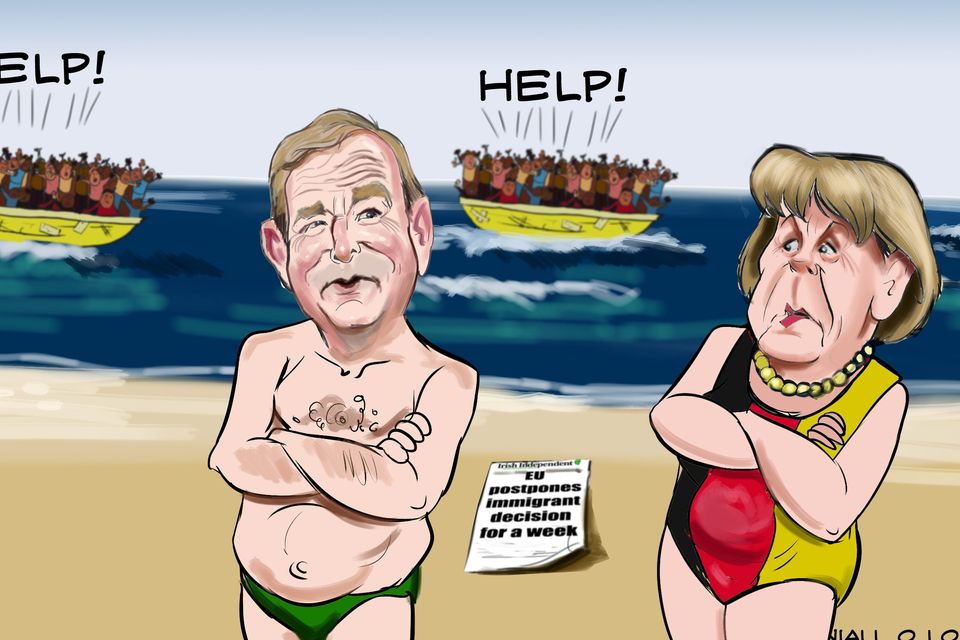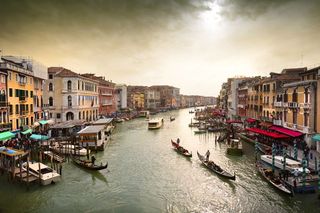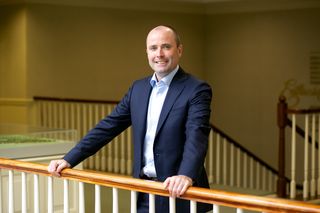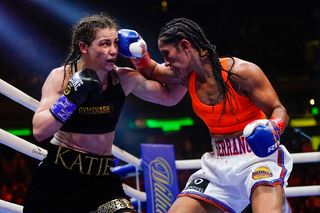Instead of the in-fighting, Fianna Fáil should reach out
Cartoon by Niall O Loughlin
As delegates congregate this weekend at the 76th Fianna Fáil Ard Fheis in the RDS, they must decide on a convincing way forward for the party, which will address not only their future but also their past. To the uninitiated, a Fianna Fáil Ard Fheis must seem like attending a Scientologists' convention. For the "true believers" inside the conference, the set piece is perfectly logical, but to the non-believers on the outside, it makes no sense at all.
It is fair to say that to some of its members, Fianna Fáil is a religion of sorts, something they were simply born into. To outsiders it looks more like a cult. An incredulous fairy story without credibility that ultimately does more harm than good to its followers. In recent years, being a member of, or having any association with Fianna Fáil, has been akin to admitting some type of social disease, prompting reactions that swing between derision and pity.
As the election campaign inches ever closer, there are now only limited chances to arrest the party's national decline and this Ard Fheis needs to be less about the in-fighting and more about out-reaching. To their credit, Fianna Fáil spokespeople seem to have responded to the call to action from their grassroot members and they are at least proffering some policies which might appeal to the electorate once again.
Some will advocate that now, the only right course of action is to concentrate on the future. However, unless the powers that be can define a narrative to deal with the past, they are arming their soldiers with only half of the ammunition needed for battle.
Rebuttal and retaliation are an important part of politics and they also need to be much sharper at holding this Government to account. Fianna Fáil must expose the weaker performers and force them out of the Dáil onto the airwaves and onto the battlefield on Government policy.
In the past, Fianna Fáil election platforms were built on two distinctly cogent strands - political competency and economic delivery. In later years, the promise to resolve the northern question has motivated much of the political emphasis of the party. Ironically, the success that consecutive Fianna Fáil Taoisigh achieved in delivering a lasting peace settlement and a stable political environment in Northern Ireland has all been but removed from their nationalist narrative.
In terms of economic agenda, the plan has largely been about economic delivery. A promise to create wealth and jobs, to drive a programme of social progression and inclusion has predominated. In 2008, when the Irish economy collapsed and our entire banking system all but imploded, one of Fianna Fáil's main political pillars crumbled around the party virtually overnight, and with it went its very foundations.
So what is left for Fianna Fáil to shout about, without being greeted at every turn by vociferous claims that it is responsible for all of our current problems?
The problem is that currently, Fianna Fáil seems so embarrassed by its legacy that it can only see its own weaknesses and can no longer see any strengths. Fianna Fáil hasn't always got things right, but it hasn't got everything wrong either.
Any fair analysis would show that as a political party, it has made a significant contribution to this country - although you would never know it from the present party narrative. Fear and loathing of its own past prevents it from articulating that it has contributed to a radically changed island socially, politically and in terms of its physical infrastructure.
Significant social changes were brought about by Fianna Fáil ministers in various governments.
Publicly financed investment in roads, rail, airports and ports under Fianna Fáil governments have contributed to a significantly changed infrastructural landscape.
Appropriate economic recognition and equality for the elderly has been a large part of Fianna Fáil's political agenda since its inception, as has the investment in education and learning.
We rarely hear any reference to these types of achievements because the trajectory is always forward and never back. There will be those who focus on the pattern of immigration throughout our history and all of the negative things that have happened in our society and point the finger once more in the direction of Fianna Fáil. Because of this we are in danger of becoming a herd, who are incapable of standing back and listening to a fair argument.
Like Bobby Ewing emerging from the shower in 'Dallas', it is simply not credible to pretend the past has not happened. You have to deal with it. There is plenty wrong with Fianna Fáil, and there were some bad people in the party, as there are in all political parties. It is also full of good decent people, motivated by social progress. It is not a crime to be a believer, it's only a difference of opinion. Yes, Fianna Fáil might want the best for its own communities and because of this some charge Fianna Fáil with clientelisim and parish pump politics. But what exactly will we be voting for, if we vote independent?
Destined to be defined as a tribe who eat their dinner in the middle of the day, its members must stand up and be counted now or face a slow and rather painful end, characterised by fear and in-fighting. In accepting responsibility for all the wrongs that have been done, they have an equal obligation to remind the commentariat of all the right things they were responsible for during their party's years in office.
There are plenty of initiatives and names to be proud of, if they take the time to look. The mistakes, perhaps borne out of default rather than design, should not be excused or forgotten, but we need to keep things in perspective.
After all, they haven't murdered anyone.
Join the Irish Independent WhatsApp channel
Stay up to date with all the latest news















